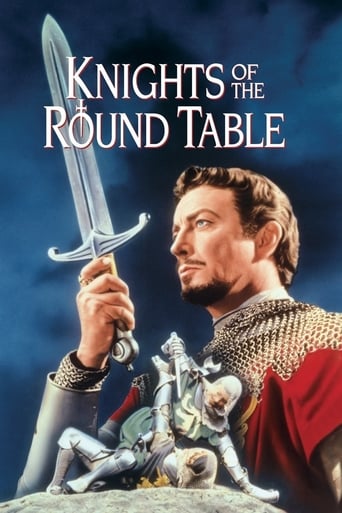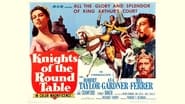Catharina_Sweden
A quite theatrical rendering of the Camelot story, that grips over too much in just a normal-length feature film: The love triangle Arthur-Guinevere-Lancelot of course, Mordred's upheaval, Merlin, Elaine and Galahad, the Holy Grail and even God's own voice (that sounded suspiciously American, to that! :-D ) One can also say a lot about other actors' pronounced American accents, and the masking is not very convincing at times (King Arthur and his beard is the worst).There are also some discrepancies here from the original story, or maybe one should say - the most common story. For instance, in this movie Lancelot and Elaine were married, but in the common story they were not. They had Galahad together, but this was because Elaine tricked Lancelot to sleep with her - when he thought she was Guinevere. Also, Merlin was murdered in the movie, while in reality this was not possible - he was living "backwards", and had at the time of the love triangle become too young to be a court magician and counsellor anymore.There is some fine dialogue, though, and something of Camelot is there in the spirit and adventure. If you like beautiful ladies in wonderful (stage) medieval dresses, handsome knights in shining armour, hearty sword fights, courtly behaviour, wonderful landscapes with mysterious old castles, etc. etc., everything in bright colouring - you will like this movie!
James Hitchcock
In his novel "The Lyre of Orpheus" the Canadian writer Robertson Davies made the point that although the Arthurian legend had played an immensely influential role in the history of English literature, there had never been a particularly distinguished dramatic treatment of the story, either in the theatre or in the cinema. (Davies discounts Purcell's opera on the grounds that its plot differs radically from what we have come to think of as the Arthurian story). And yet the story seems to offer great dramatic possibilities, both in its adventure elements and in the Arthur-Guinevere-Lancelot love triangle. "Knights of the Round Table" was the second in an unofficial trilogy of films on a mediaeval theme made by producer Pandro S. Berman and director Richard Thorpe, all of which starred Robert Taylor. (The others in the trilogy, both based on the novels of Sir Walter Scott, were Ivanhoe and The Adventures of Quentin Durward). It is based upon Thomas Malory's "Le Morte d'Arthur", although it makes some changes. The Quest for the Holy Grail plays a less important role in the film than in the book, Elaine is Lancelot's wife rather than his lover, and their son Galahad, who plays a key role in the book, only appears as a baby. Apart from Lancelot and the villain Mordred (here referred to as "Modred"), the most prominent of the knights is Sir Percival, in this version Elaine's brother. The film is ostensibly set in the Britain of the 5th or 6th century, after the end of the Roman occupation, but as is usual in films on this theme (the recent "King Arthur" being an exception) the costumes, armour and buildings are all based upon those of the High Middle Ages, that is to say of Malory's day rather than of Arthur's. Arthur's kingdom is always referred to as "England", even though the historic Arthur (assuming that he was a real person) would never have used this term. The Celts would always have referred to "Britain", the name "England" ("Land of the Angles") being used only by their Anglo-Saxon enemies. The story begins with Britain in turmoil, divided among various warring overlords. Arthur, the illegitimate son of the former ruler Uther Pendragon, is able to unite the kingdom and, with the help of Lancelot and the wizard Merlin, to defeat his main challengers, his half-sister Morgan Le Fay and her son Modred. (Anne Crawford who plays Morgan was only eight years older than Stanley Baker, who plays her son. Presumably the explanation is that Morgan's enchantments have been able to preserve her youthful looks, and things could have been worse. The original choice for Modred was George Sanders, fourteen years older than Crawford). After his victory Arthur pardons Morgan and Modred, against Lancelot's advice, but they continue to plot against him, and see the growing attraction between Lancelot and Arthur's wife Guinevere as their chance to make trouble. One of the problems with Arthurian films and plays is that the love- triangle is so central to the plot that it requires three high-quality performances if it is to succeed. Taylor here makes an attractively dashing Lancelot, although the film misses one of the key themes of Malory's work. In Malory Lancelot, an otherwise ideal knight, is morally compromised by his adulterous affair with Guinevere, but in this version their love is not physically consummated, possibly in order to keep the censors happy, and the result is that he seems a much less morally ambiguous figure. The film tries to contrast the "flawed" Lancelot with the idealised Percival, but Lancelot's flaws seemed to me very minor ones. Arthur is another complex character, difficult to realise on screen, because he is on the one hand a powerful, heroic monarch and on the other someone compromised by his status as a cuckold. In mediaeval literature cuckolds were generally seen as weak, pitiable or ridiculous, like Alison's husband in Chaucer's "Miller's Tale". Probably the best screen Arthur I have seen was Sean Connery in "First Knight", but that film subtly altered the traditional tale by making Arthur much older than Guinevere or Lancelot. Here Arthur comes across as a forgettable nonentity when he should be at the film's centre, and this is due partly to the wooden acting of Mel Ferrer and partly to the sanitising of the Lancelot/Guinevere relationship which also removes much of the interest from Arthur's character. As for Ava Gardner, she certainly makes a lovely Guinevere, but she was capable of much better acting than this. (As, for example, in "The Barefoot Contessa" the following year). Baker is not bad as Modred, but I think that Sanders, who had been so effective as Brian de Bois-Guilbert in "Ivanhoe", would have been better. The film is visually attractive, with much emphasis on pageantry and spectacle, but I did not enjoy it as much as "Ivanhoe". (I have never seen "Quentin Durward"). It is certainly better than the dull and turgid "King Arthur", but the problems with characterisation made me aware just why it can be so difficult to make an effective Arthurian drama and to understand what Robertson Davies may have meant by his dictum. 6/10
rogerblake-281-718819
I first saw this film as a twelve year old when you had a continuance performance and I literally had to be dragged from my seat by members of the local constabulary as my mother had reported me missing when I didn't turn up on the bus.What an experience for a young lad,knights in shining armour,jousting,battles and sword fighting.Heroes riding to the rescue of fair damsels,wrongs to be righted and villains to be thwarted,and all in glorious Technicolor and Cinemascope.I didn't go much on the lovey dovey stuff but at least it was kept within reason.I recently saw the film again,perhaps I am getting cynical in my old age because although it was still very entertaining I could see what a load of rubbish it really was.Fair play to the cast who take it all very seriously and an approving nod to Robert Taylor,Ava Gardner,Mel Ferrer and especially Stanley Baker,his villainous turn was something else.The best way to enjoy this film is to treat it as a cross between a Carry On film and an old fashioned English pantomime.It is meant to be pure entertainment and as Sam Goldwyn so aptly put it "Messages are for Western Union".Did such heroes as the Knights of the Round Table,Robin Hood and St George of merry England really exist? I would like to think so and if they didn't then they jolly well should have done.In these desperate times we could really use heroes such as these.Perhaps we should stick to Hollywood's version of the Middle Ages because the reality was vastly different.It was the age of the thumbscrew,the rack and the branding iron and as for methods of execution if you were impaled,burnt at the stake or hung,drawn and quartered you were probably lucky because imaginative magistrates could soon find other ways of having you dispatched.Just to add to the general misery you also had the plague and the black death.If you want to see a more realistic take on the Round Table Cornel Wilde's Lancelot and Guinevere is well worth a look.Finally if you have a strong enough stomach Vincent Price in The Witchfinder General gives a bleakly realistic view of late medieval England during the English civil war.Personally I think Hollywood's version of "merry" England is much more fun.
fnarf999
This movie is a camp classic: so appallingly written and acted that one is transfixed with ridiculousness. I'm sure it was great fun to parade around in these ludicrous clothes and say these lines. Complete with cartoon sets -- check out the Styrofoam Stonehenge! Even the horses are funny. People think Monty Python was satire, but it was really straight documentary. The speaking parts artfully combine John Wayne swagger with cod-Shakespearean silliness. "That, Sir Knight, shall be mah playsher." Ava Gardner is radiant but talentless, and Robert Taylor, well, he's just talentless. I give it a six for entertainment value, but believe me, this is a terrible, terrible movie.




